Own Your Hypocrisy
Chapter Nine
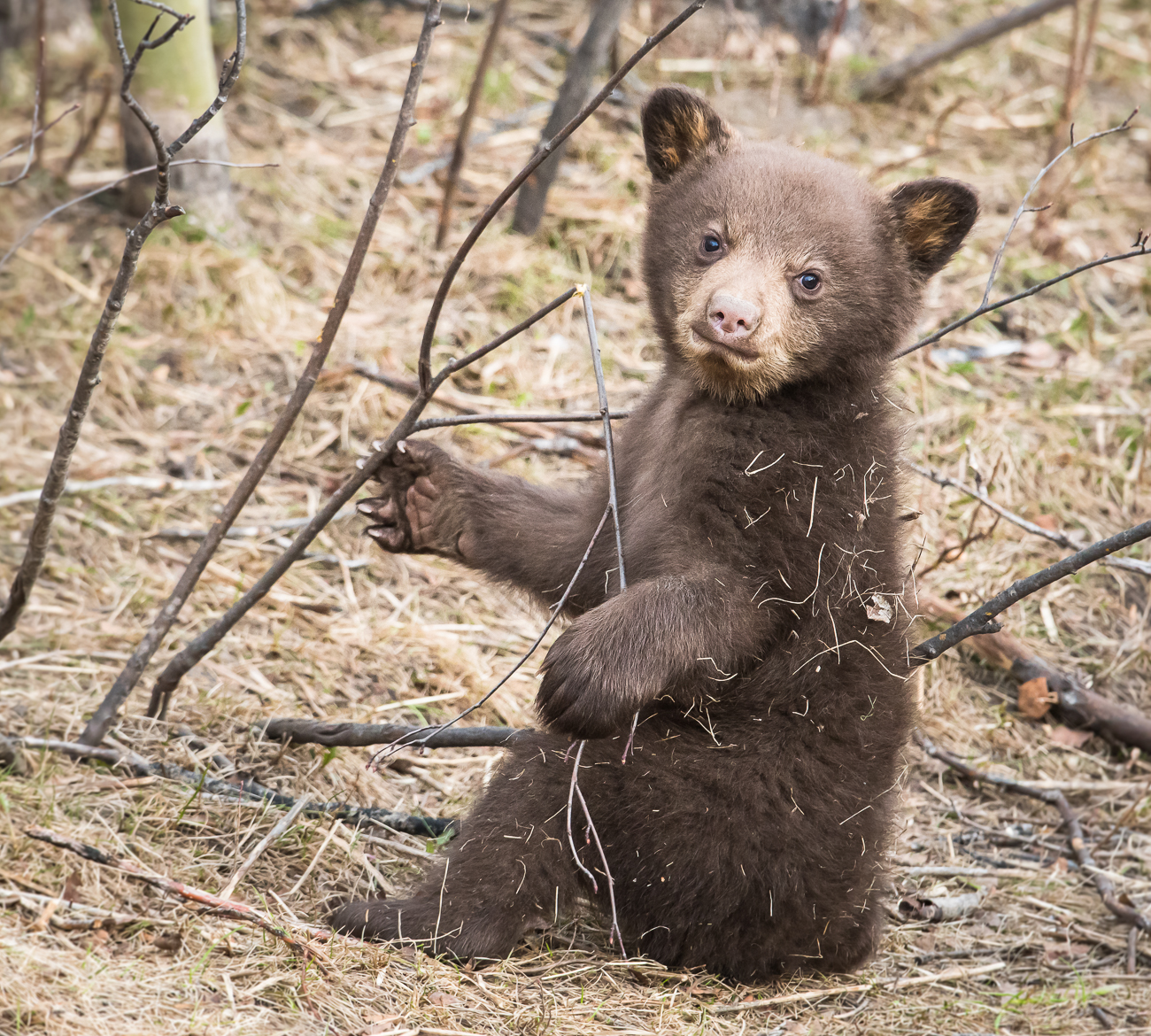 My friend has this saying: “Hypocrisy is humanity’s favourite pastime.”
My friend has this saying: “Hypocrisy is humanity’s favourite pastime.”
It’s a funny line because, when you think about it, it’s true.
We’re all hypocrites.
All of us.
We complain that the media never talks about reconciliation or economics or nature…and then flip to the game when the news actually covers the story.
We say we hate consumerism, but we just can’t seem to help ourselves when that thing we’ve been lusting after is finally available on Amazon ON SALE.
We say we hate politicians that are fixated on short-term electoral goals, yet we fail to participate in policy conventions and candidate elections…and then vote out the bums when they haven’t solved inflation or climate change in four years or less.
See? We’re all hypocrites.
Being a hypocrite isn’t the problem – as my friend says, that’s just being human.
What is the problem? Not being honest about our hypocrisy.
“We say it’s these systems or these tools or these platforms that are the problem. It’s actually ourselves. We need to grow up.” – Jerry McGrath | Art Innovator
Yes, we need to think more critically about the issues we face and, yes, we need to communicate – and listen – more thoughtfully. But those skills are irrelevant if we lack self-awareness.
“Before you can criticize something, make sure that you’re not a part of it.” – Takoda Coen | Youth Leader & Farmer
When we’re not honest with ourselves, it becomes much easier to blame the shortcomings of society on that other person.
“We need to recognize that we are living in difficult times and a lot of people have simple answers to questions and it’s easy to try and identify scapegoats.” – Rt. Hon. Kim Campbell | Former Prime Minister
Once we become fixated on scapegoats – those on the political left or right – well, things get pretty ugly, pretty fast.
And our debates are getting ugly. Very ugly.
“I am increasingly concerned about the fragility of democracy in the current global context. I’m worried about the decline of civility in public and political discourse, the decline in respect for our public institutions and democratic conventions. I’m worried about the erosion of trust in society.” – Hon. Janet Austin | Former BC Lieutenant Governor
 Protests. Counter protests. We’ve seen it all in the wake of the COVID-19 pandemic.
Protests. Counter protests. We’ve seen it all in the wake of the COVID-19 pandemic.
And, sure, divisive debates aren’t new, but the level of vitriol in our debates is getting worse.
“People are really disappointed by the lack of change that happens by empowering the folks that they thought were going to make their lives better. If their lives don’t get better, there’s going to be sort of a mini revolt.” – Mark Miller | TV Producer
“I think this is an extremely dangerous situation.” – Hon. Janet Austin | Former BC Lieutenant Governor
Why?
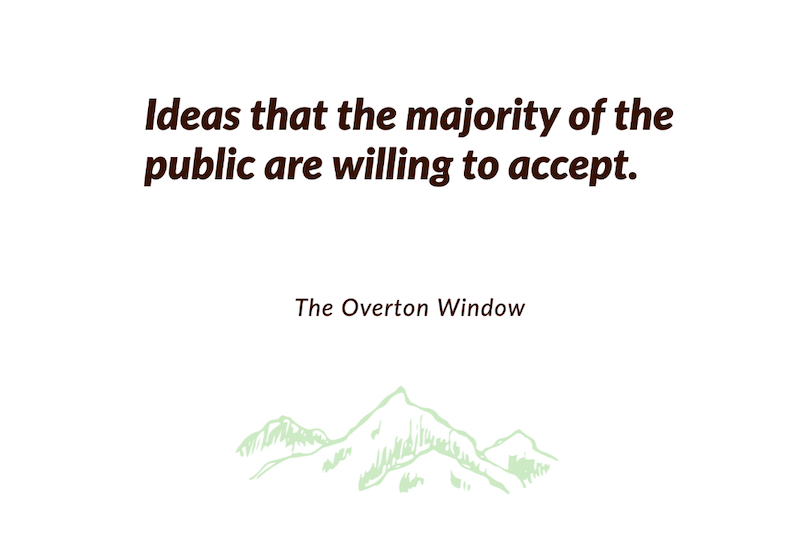 Well, it has something to do with the Overton Window.
Well, it has something to do with the Overton Window.
The Overton what? Pollster Shachi Kurl explains.
“It’s not a window on Overton Street. Basically, before social media, you had what was considered socially, politically, societally acceptable viewpoints that were on a spectrum. It wasn’t about living in a totalitarian state where only one perspective was okay, there was a spectrum of issues.”
Shachi continues, “But the Overton Window ensured that the really fascist stuff on one side didn’t come into the mainstream and the really hateful stuff on the other side didn’t come in and the really loopy stuff on the third corner didn’t come in. And that was basically a function of a free and functioning press, but also a free and functioning press that was limited by technology to say, 20 newspapers, five or six television networks and number of radio stations. There was only a limited place where people were getting points-of-view that were on a more limited spectrum.”
 Today? The Overton Window is wide open and it’s -50 outside.
Today? The Overton Window is wide open and it’s -50 outside.
As Shachi explains, “We now live in the era of social media, where hate speech is now rolling fairly freely, where it doesn’t take two seconds for people to think: ‘Well, the fire at the Notre Dame was not just a fire.’ These are things that people might have talked about around the watercooler in passing a few years ago, but now they’ve taken on a weight and a spreadability that it didn’t used to have.”
Unlike a window in our home, it’s not super easy to close. But it wasn’t super easy to open either.
“What we used to have was this ‘voice of God’ – Walter Cronkite, Peter Jennings”, journalist Salimah Ebrahim tells us. “The good thing about that was that we agreed on a common set of facts.”
But the media is changing, Salimah adds.
 “What we have right now is a balkanization, I think, of the media. It’s become so splintered that it seems like people can operate from a different set of assumptions or, even worse, a different set of facts that can exist alongside each other.”
“What we have right now is a balkanization, I think, of the media. It’s become so splintered that it seems like people can operate from a different set of assumptions or, even worse, a different set of facts that can exist alongside each other.”
As you can guess, this evolution of the media landscape didn’t happen overnight. But one reason it did happen was because too few of us saw our stories – our perspectives, our faces – being reflected back on the nightly news, as historian and youth advocate Jane Thompson argues.
“Walter Cronkite may have been a fabulous arbiter of what was real news and fake news, but there have been a lot of other stale-pale-males out there saying that they represented truth. And over the past 20 years it has come out that that absolutely wasn’t true. Gay people and women and women of color and Indigenous and all kinds of folks were not represented in that very narrow, homogeneous, tightly controlled, ‘we’re the arbiters of truth’.”
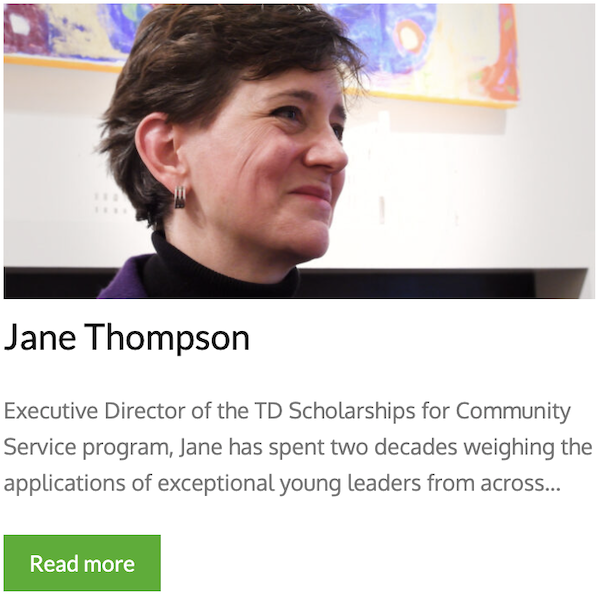 Donna Kennedy-Glans, a former conservative Alberta cabinet minister and energy executive, agrees that the media of old wasn’t – and still isn’t – working for enough people, including rural, conservative Alberta.
Donna Kennedy-Glans, a former conservative Alberta cabinet minister and energy executive, agrees that the media of old wasn’t – and still isn’t – working for enough people, including rural, conservative Alberta.
“We’re used to turning on the TV – people my age anyway – and watching somebody tell us what the news is from somewhere else. And most of the stories about our place here in, say, Alberta are written by people who live in New York or Toronto or someplace else. And they may have talked to somebody from here, but they may not have. I think that really has to change.”
As we’ve covered, when we don’t see ourselves in a narrative – in a story being told about us or to us – it’s only natural for people to feel left out.
And when we feel left out, we seek a space that’s more inclusive of our worldview – our people, our community.
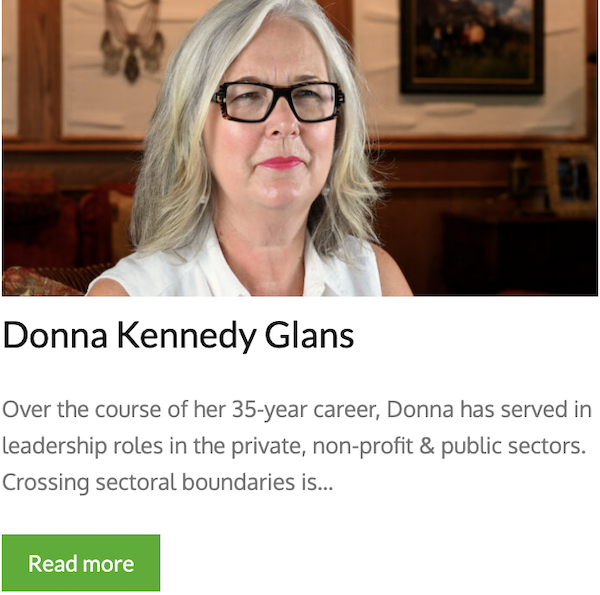 But when that happens? Echo chambers are born.
But when that happens? Echo chambers are born.
“The phrase echo chamber is way over used now, but it’s still on-point in terms of helping us understand why groups tend to cluster the way they do.” – Garrick Ng | Storyteller & Entrepreneur
“This is directly related to the fragmentation of the media landscape and people do now retreat into their own media bubbles. People do consume media which only confirms their own prior biases. We are able now to more or less shut out media that we don’t want to hear, that doesn’t conform with what we already believe.” – Dr. Will Greaves | Political Scientist
“There is definitely an echo chamber on both sides.” – Story Warren | Biologist
“And that’s a problem.” – Dr. Will Greaves | Political Scientist
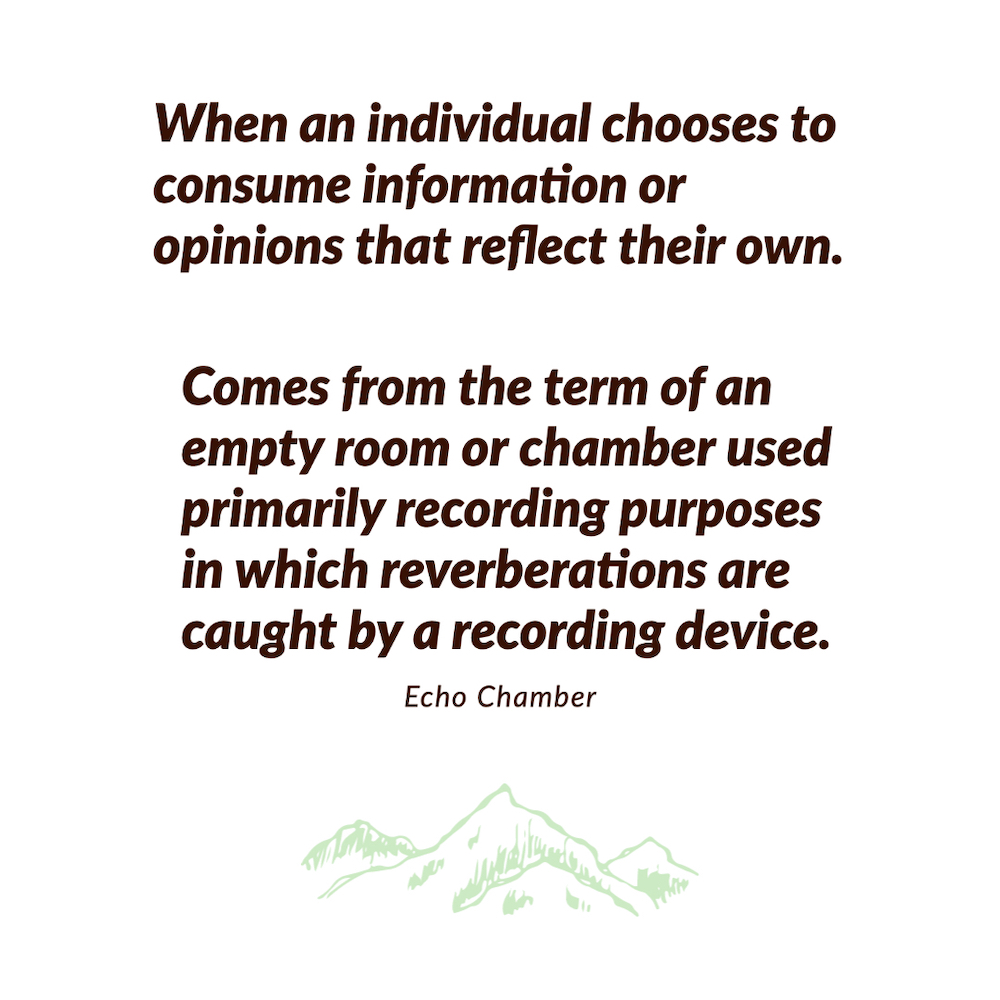 Look, it was probably inevitable that our media model would change with technology, just as it always has. And as journalist Salimah Ebrahim points out:
Look, it was probably inevitable that our media model would change with technology, just as it always has. And as journalist Salimah Ebrahim points out:
“We’ve had challenges before. Because, at the end of the day, when you had, for decades and decades and decades, a singular white man – and it was usually a white man – be the voice of God to explain our world, that wasn’t ideal either. As a woman, as a person of color, I mean, I don’t think that the climate was riper 20-years-ago or 15-years-ago.”
But the Overton Window didn’t fly open at first touch. It was incremental and it happened, in many ways, because of good intentions, pollster Shachi Kurl explains.
“When issues are layered in around social justice, around equality and the rest of it, well, who’s equality? Whose social justice are we talking about? Every action has a reaction.”
In other words, in pursuit of a more just media model, we forgot about the law of unintended consequences.
“The democratization of information and equalization of access to information is a wonderful thing,” Shachi tells us. “But it also means that we’re now in the era of instant expertise.”
This might get confusing, but stick with me:
Once we threw away the old media model, we no longer had a trusted arbiter of fact. And we didn’t think that was a problem because we found a newer arbiter of fact that better reflected who we really are. And that was fine until we realized that what’s working for us, is also working for our neighbour.
But we hate our neighbour and everything they stand for!
So, we found refuge from the new platforms we didn’t like by doubling-down on the ones we did like – the ones in our community. And because it’s our community, we debated how best to react to the bad platforms amongst ourselves. And that meant the solutions we came up with were the consensus opinion of our community – not all communities.
That meant the gravitational pull of our community’s centre changed our perception of what’s actually centrist or moderate in the eyes of all communities. And as this was unfolding in our community, it was also unfolding in other communities.
And with each community having defined their centre around their community’s ideals, we suddenly discovered that the distance between our communities had grown a little bit and that we no longer have anything in common.
That? Yeah, that’s the problem. And Shachi Kurl agrees.
“They seem to have very little to talk about anymore.”
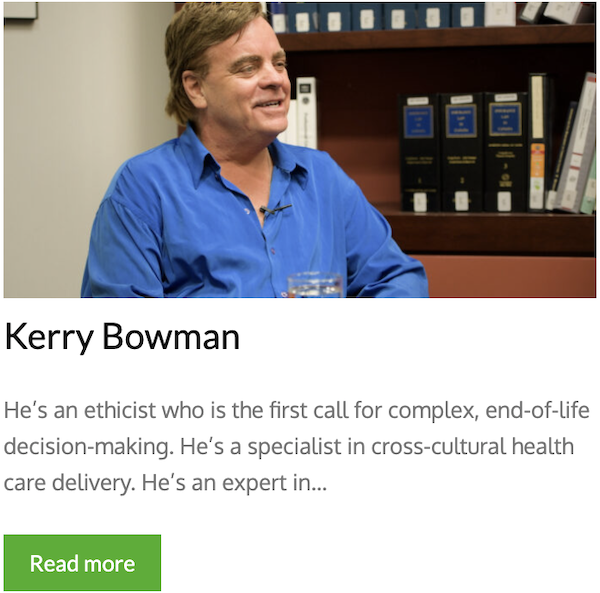 Why does that matter? As ethicist Dr. Kerry Bowman tells us, “If we become polarized, all of this is going to get a lot, lot worse.”
Why does that matter? As ethicist Dr. Kerry Bowman tells us, “If we become polarized, all of this is going to get a lot, lot worse.”
Worse for people. Worse for nature. Worse for everything.
After all, as political science professor Will Greaves says, “the only way that change can be advanced is collaboratively and is in a way that is based on consensus building and mutual respect and the efforts to find common ground, as much as possible, on these questions.”
For that to happen, Shachi believes “we’re going to have to get to a place where everyone’s sort of buying into something in a way that everyone feels like whatever it is they’re hearing is acceptable or palatable to them.”
But as Kerry Bowman points out, that appears to be increasingly impossible.
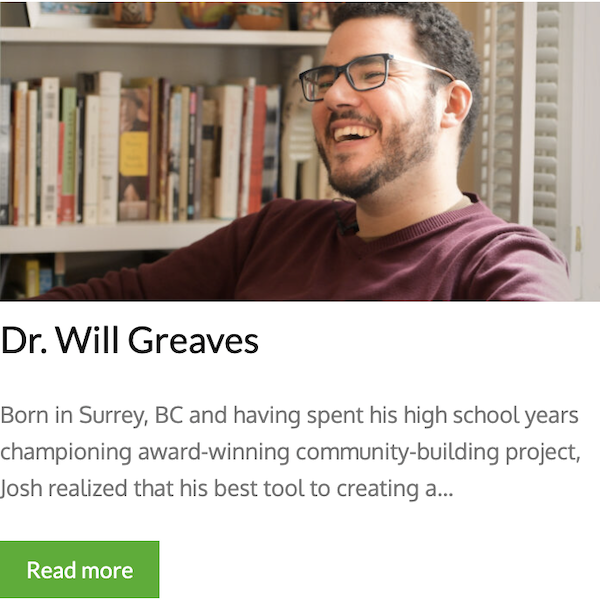 “Once complexity begins, you’ve got A versus B and all this common ground between you is lost in the feud.”
“Once complexity begins, you’ve got A versus B and all this common ground between you is lost in the feud.”
And as our former prime minister adds, “that’s a result of dogmatism and an ideology which really worries me.”
It’s additionally worrying because inside the cozy confines of our echo chambers of like-ness, we struggle to see up from down; we don’t realize how we’re each fanning the flames of division.
“It’s increasingly called virtue signaling on different issues. We have to get away from that. But the finger wag, on all sides, is very, very quick to come out now.”
Shachi Kurl is right.
When we conjure up a picture of tyranny in our brains, we usually see, say, Vladimir Putin.
 But tyranny comes in many shapes and forms. Like the bully on the school bus. Or the bully hiding behind a fake name on Twitter, as young changemaker Story Warren tells us.
But tyranny comes in many shapes and forms. Like the bully on the school bus. Or the bully hiding behind a fake name on Twitter, as young changemaker Story Warren tells us.
“Especially in the last couple of years, it’s been become increasingly hard to have actual dialogues with people on social media. If someone disagrees with you, then you just shout at them, say horrible things, threaten them. It’s something that I’ve seen a lot unfortunately, because they don’t want to have a conversation with anyone who believes otherwise.”
Story adds “If someone is attacking someone who doesn’t agree with you, don’t be a part of that. Speak up for those people because you’re not going to change anybody’s mind by shouting at them or calling them names.”
And as obvious as that might sound, we don’t always realize someone is being bullied if we’re caught up in schoolyard politics – if we’re part of the clique or want to be seen as being in with the right group or believe we’re on the side of angels, standing up against the brutes on the other side a debate.
In reality though, as Shachi Kurl argues, there are fewer and fewer angels left in our debates.
“We have lost the ability to question respectfully, without being accused of either being a terrible person or not being patriotic or this or that.
“So, we can’t have questions about: Is carbon pricing really the best solution for dealing with what we need to deal with around environmental change and degradation? If you question it, all of a sudden, you’re a hateful person who hates the planet”, Shachi argues.
“You cannot have a conversation around immigration levels: Are we really bringing in the correct number or the correct jobs, skills, education of immigrants? You can’t ask that without people sort of questioning whether you’re truly a Canadian or whether you’re a racist.”
Shachi concludes that “so much of the debate on so many issues in this country has really been boiled down to ‘it’s this or it’s that’ and ‘it can’t ever be both’ and ‘this one is right and that one is wrong’.”

All of what Shachi just described, as she noted earlier, is partially a by-product of virtue signalling – ideological purity tests, identity politics, whatever you want to call it. It’s a way of intimidating people in closed or like-minded communities – echo chambers – to embrace specific perspectives that might otherwise not be accepted in the wider society.
But, again, because we busted the Overton Window by changing how we consume our facts – for good reasons, sure – people can now be more easily bullied into thinking fringe opinions on both the political left and right are not so fringe anymore.
Political Science professor Dr. Will Greaves adds that this phenomenon “also gives rise to conspiracy theories. It gives a platform to what were previously really marginal views – views that were socially stigmatized, that would be unacceptable – and now they are able to get a foothold.”
As each community or ideology rallies behind views seen as more extreme to the other, the natural reaction for the other side is to react in-kind, pushing each community further towards the extremes.
It’s a vicious cycle that’s hard to break. And the more we lack introspection? The more naïve we are to our contributions to the problem and the worse the problem gets.
So, yeah, Billy Joel was right. We didn’t start the fire. But if we’re trying to fight it? So far, we’re only doing so with gasoline.
“We’re choosing this. We’re making choices to only hear people who sound like us and to use products that make that easier.” – Jerry McGrath | Art Innovator
“It does worry me about social media because you can just throw barbs out at people and you don’t have to take any responsibility for it. It erodes relationships and it gets people to dig their heels in and only hear one side.” – Barbara Cartwright | Welfare Advocate
“They grab onto this myth and the myth becomes their reality because they say it enough times.” – Donn Lovett | Political Organizer
“As a result, it’s so challenging to get out of that world.” – Garrick Ng | Storyteller & Entrepreneur
“I just think we need to prick the bubbles of these echo chambers.” – Mark Miller | TV Producer

“How can you create environments where people can come and listen and hear each other and agree to disagree or agree to change?” – Barbara Cartwright | Welfare Advocate
“How do you fight it in the age of social media? That’s a tough question. And I think we know, for the time being, it requires almost tailoring a message to each of those echo chambers.” – Shachi Kurl | Pollster
“But I think we should make it part of a challenge to really come together and force ourselves to listen to people who don’t agree with us.” – Rt. Hon. Kim Campbell | Former Prime Minister
“But unless we stay in communication with each other, we’ll never get there.” – Barbara Cartwright | Welfare Advocate
“If one looks at the world today, we are in very dangerous, complicated times that could skew countries or societies or the world into ecological oblivion or war or require teenagers in battles to lose their lives instead of have their futures.” – Rick Antonson | Author